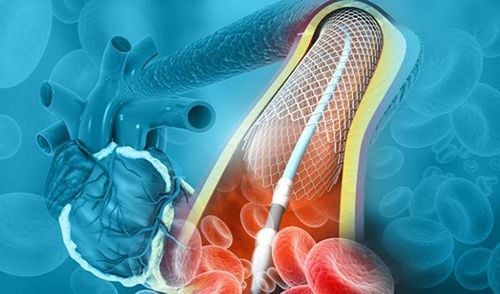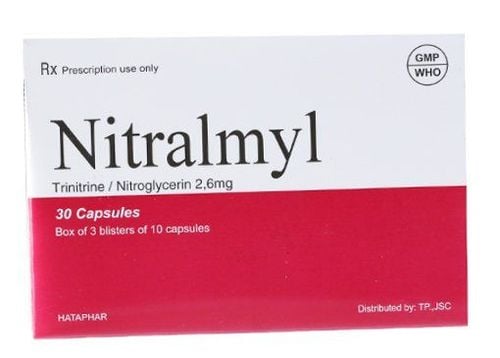This is an automatically translated article.
Vitamin K antagonist is one of the indicated measures in atrial fibrillation. However, this method is still quite vague, especially for patients. Let's learn more about vitamin K antagonists, what are the effects of vitamin K antagonists in atrial fibrillation.
1. What is a vitamin K antagonist?
Vitamin K antagonists (also known as vitamin K antagonists - oral anticoagulants, used to treat and prevent blood clots in blood vessels.) ; Preventing an increase in the size of blood clots; Vitamin K antagonists work by inhibiting the synthesis of vitamin K dependent clotting factors in the liver. synthesize clotting factors, help reduce the risk of bleeding
1.1. Indications for vitamin K antagonists Vitamin K antagonists are indicated for the following subjects:
Mechanical heart valve replacement; Atrial fibrillation; Venous thrombosis; Pulmonary embolism; Pulmonary arterial hypertension; 1.2. How to take vitamin K antagonists Vitamin K antagonists are taken orally according to the instructions of a doctor/pharmacist.It should be taken at a fixed time of day to be effective.
Dosage of vitamin K antagonists is specified in each subject, based on blood clotting time when doing INR test with different patients. need to achieve. Adhere to the dose, time of administration, avoid overdose, low dose because it can increase the risk of blood clots.
1.3. Side effects of vitamin K antagonists Taking vitamin K antagonists you may experience some side effects including:
Bleeding; Fainting; Headache ; Dizziness Half body weakness; Numbness/itching of face/hands/legs; Muscle pain; Prolonged menstruation; Pink urine; Bloody stools/black stools; Unusual bruising of the hands/feet; Sudden shortness of breath; 1.4. Interactions with vitamin K antagonists Some drugs can cause interactions when taking vitamin K antagonists, including:
Antidepressants; Antibiotics of the group Cephalosporin, Fluoroquinolo, Macrolide, Sulfamethoxazol...; Blood lipid-lowering drugs; Antifungal drugs; Antiepileptic drugs; Cimetidine; Glucocorticoids; Allopurinol; Paracetamol; Vitamin E; ... Inform your doctor about the medicines you are taking when there is a prescription for vitamin K antagonists.
2. Vitamin K antagonists in atrial fibrillation
Before learning what are the effects of vitamin K antagonists in atrial fibrillation? You need to know what is atrial fibrillation?
2.1 What is atrial fibrillation Normally the sinus node is capable of generating regular electrical impulses. These impulses are transmitted to neighboring cardiac muscle cells. They will follow the conduction system to spread, controlling the heart to beat rhythmically.
When the impulse does not start at the sinus node but at various locations in the atria. This will cause the atrial muscle stimuli to continuously work in a fluttering state instead of synchronously and rhythmically contracting.
Patients with atrial fibrillation may have no or many unpleasant symptoms. Some symptoms of atrial fibrillation such as: Heart palpitations; shortness of breath; shortness of breath; dizzy; sweating; chest pain;
When atrial fibrillation is not intervened in time, the heart will be under great pressure because it has to beat rapidly. In the long run, it will cause the heart to dilate, the ability to eject blood is not effective. This can lead to congestive heart failure, stroke...
2.2 What are the effects of vitamin K antagonists in atrial fibrillation? Vitamin K antagonists are the first-line anticoagulants used in patients with atrial fibrillation. Vitamin K antagonist therapy is highly effective in patients with atrial fibrillation such as:
Reduces the risk of stroke by 2/3; 1⁄4 reduction in uterine risk with no treatment or aspirin use; Vitamin K antagonists are used in many subjects with atrial fibrillation with high efficiency. This result was reflected in the Warfarin arm of other oral anticoagulant trials.
Although the limitation of vitamin K antagonists in atrial fibrillation is the narrow treatment window, periodic monitoring and dose adjustment, but with sufficient time, the drug can prevent stroke risk.
Currently, vitamin K antagonists are the only safe treatment in patients with atrial fibrillation who have an underlying rheumatic mitral valve/mechanical heart valve.
The goal of treatment for atrial fibrillation is to prevent complications, return to normal sinus rhythm, or control the ventricular beat. Therefore, taking vitamin K antagonists is one of the indicated treatments for atrial fibrillation.
The advantage of vitamin K antagonists in atrial fibrillation is that antagonistic drugs can be used to bring back blood clotting to normal. Along with that is the low cost of treatment.
2.3 Dosage of Vitamin K antagonists in AF The standard dose of vitamin K antagonists in AF is 5mg/day for 5 days. During administration, the partial thromboplastin time (or INR) should be monitored daily until the therapeutic threshold is reached. Thereafter, the assessment must be continued 3 times / 2 weeks. The starting dose may be lower for the elderly, who are at risk of bleeding. The maintenance dose is 1 to 4 mg/day depending on the individual patient. Special target groups such as: Heart failure; Hyperthyroidism; Renal failure;... Lower dose is required. The required INR concentration is 2.0 - 3.0 because this index shows the highest efficiency, but there are also some groups of subjects that need higher or lower INR such as: Atrial fibrillation in mechanical valve disease; Atrial fibrillation in people with cerebral hemorrhage; Once the warfarin dose is stabilized, periodic evaluations are still needed every 4-6 weeks.
3. Notes when using vitamin K antagonists in atrial fibrillation
Some safety notes when using vitamin K antagonists in atrial fibrillation include:
Eat scientifically; Exercise regularly, pay attention to physical activities; Keep away from tobacco and smoke environment; Maintain a healthy weight; Control blood pressure; Control cholesterol levels; Periodic health checks; Vitamin K antagonists in atrial fibrillation are important. This is considered an effective treatment for atrial fibrillation. Although vitamin K antagonists in atrial fibrillation have many disadvantages, it is still a highly appreciated method. Take medicine safely, do not forget to consult your doctor/pharmacist.
Please dial HOTLINE for more information or register for an appointment HERE. Download MyVinmec app to make appointments faster and to manage your bookings easily.













